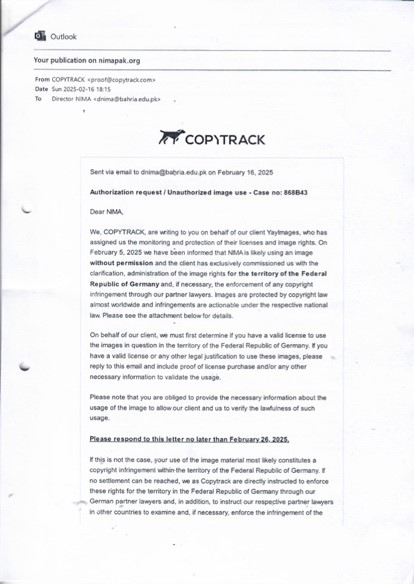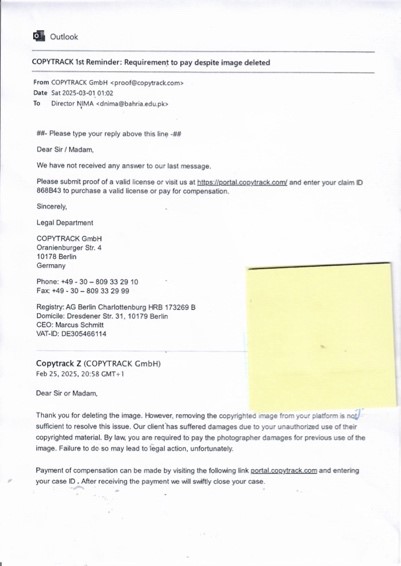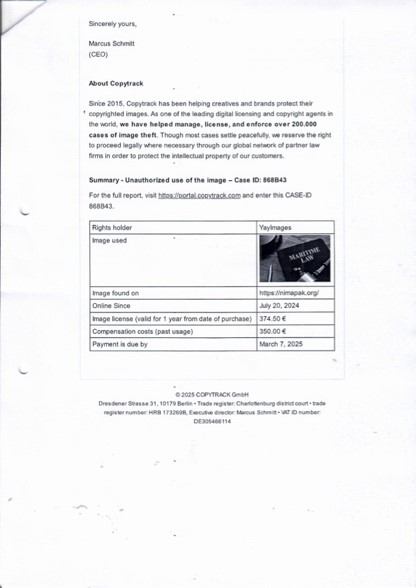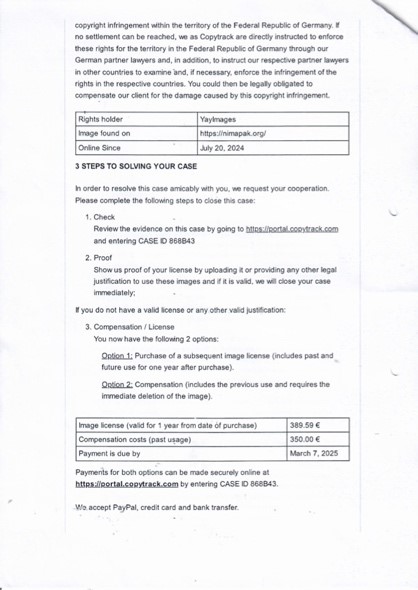The copyright scam, you didn’t see coming….!!
How WebInfinites Took a Stand Against Copy Track’s False Claims….
The second Ramadan morning – peaceful, routine predictable. Like any other day my morning ritual begins with checking my mobile, but this time instead of usual flood of emails I met with something far more unsettling —an urgent notice that my company is at the verge of being penalized for copyright infringement. This totally made me rethink my life. Existential crisis can hit you harder but this was too much. Fire off a blazing response? Because clearly this had to be a mistake but then I was quite astonished to see that I was not the first.
Let me take you through what has really happened….
One of our prestigious clients, a leading think tank in Islamabad, Pakistan, reached out to us, confused and concerned. They had received an alarming email from Copytrack, a company claiming they had used a copyrighted image on their website without proper licensing.
Upon receiving this notice, they immediately removed the image, assuming that would resolve the issue. But Copy track had other plans. They sent another email, insisting that merely deleting the image wasn’t enough—they were now demanding financial compensation for “unauthorized past usage.
Who is Copy track?
A Copyright Enforcer or a Legal Extortionist?
At first glance, ‘copy track’ appears to be a company specializing in tracking and enforcing copyright violations. Their website informs about helping photographers and artists recover lost revenue due to unlicensed image use.
However, a deeper investigation suggests that Copytrack’s methods often border on aggressive legal intimidation. Many companies worldwide have reported receiving similar threatening emails, demanding compensation for unintentional image usage, even when images were removed immediately.

Red flags started popping up:
- Their email template looked very similar to several reports of online copyright scams.
- They cited legal consequences, but their claims lacked clear, actionable legal documentation.
- The payment process directed victims to a portal without any legal arbitration process, making it look more like a money-making operation than a true legal dispute.
The proof of the scam is in the emails below:




Take a close look at these emails and ask yourself:
- Why would a company demand payment instead of taking formal legal action?
- If the image was legally purchased, why aren’t they suing the stock image providers instead?
- Why does the amount demanded seem arbitrary, with no real breakdown of damages?
By sharing these emails, WebInfinites hope to educate businesses and individuals on how these scams operate. This is not just about one company—this is about standing up against unethical intimidation tactics. And these emails have been shared with the permission of the client.
The Reality of Copyright Infringement – What You Need to Know
To be clear—copyright laws exist for a reason, and unauthorized use of copyrighted images is illegal. However, the way Copytrack and similar companies operate preys on businesses that might not even be aware of minor infractions.
Here’s what businesses in Pakistan must understand:
- Not every “copyright infringement notice” is legitimate. Always verify the source.
- Deleting an image should resolve an issue, but some companies exploit fear.
- If you receive a demand for payment, consult a legal expert before making any transactions.
- Use royalty-free or properly licensed images to avoid any risks.

- Here is a pie chart showing the distribution of online scam victimization vs. awareness efforts in Pakistan. It highlights:
- 52% of Pakistanis have fallen victim to online scams at least once.
- 91% are at high risk of falling for online scams due to a lack of awareness.
- 40% of all complaints to the FIA in 2022 were related to financial fraud.
- Only 10% of agencies and organizations are actively working on spreading awareness.
The future is digital, and women are acing it all over the world.
How WebInfinites Handled It:
As a creative director and a woman entrepreneur in Pakistan, I’ve learned that challenges come with the territory. In a society where women are often questioned for their decisions, made to feel like they’re not enough, and conditioned to second-guess themselves, it’s easy to fall into the trap of fear when faced with something as intimidating as a legal notice.
But instead of letting that fear take over, I took a rational, strategic approach. I immediately discussed the situation with my lead developer and designer, and they reminded me of a critical fact—we don’t just randomly pull images from the internet. We have active memberships on legitimate image platforms like Canva, Freepik, and Shutterstock. The so-called “unauthorized image” had been legally acquired from one of these sources. So, if anyone should be sued, it should be these stock image providers, not our prestigious clients like NIMA, who had no role in this alleged violation.
Armed with this knowledge, we didn’t panic or comply with Copytrack’s aggressive demands. Instead, we:
- Cross-checked our image sources to ensure compliance.
- Consulted legal experts, who confirmed that their claims lacked enforceability.
- Responded with confidence, refusing to pay for an infringement that never actually happened.
And guess what? The emails stopped. No follow-ups. No further legal action. Just silence.
That’s when it became crystal clear—this was a classic intimidation tactic. A carefully orchestrated scheme to exploit fear, hoping businesses would pay up without questioning the legitimacy of the claim.
This experience reinforced an important lesson: Fear and doubt are their greatest weapons—but knowledge and confidence are our best defenses.
Lessons for Businesses in Pakistan:
Always use images from legitimate sources – opt for stock photo websites like Unsplash, Pexels, or Shutterstock.
- Double-check copyright claims – scammers often exploit legal gray areas.
- If you receive a copyright demand, seek legal advice before making any payments.
- Be cautious of companies that demand money without a court-issued notice.
Final Thoughts: The Digital world Needs Awareness:
The internet has become a legal battlefield, and businesses need to stay vigilant. Companies like Copy track blur the lines between enforcement and exploitation, leaving many businesses confused and pressured into payments.

This case is a wake-up call for organizations in Pakistan to be proactive about digital rights, copyright policies, and scam awareness. Because if a respected think tank like NIMA can be targeted, any business can be next.
This experience was a reminder that fear thrives in uncertainty, but knowledge is power. Many businesses in Pakistan may fall for such scams simply because they lack awareness or the confidence to challenge fraudulent claims.
As business owners, entrepreneurs, and professionals, it is our responsibility to stay informed, question dubious demands, and protect our rights in the digital space. If this case study helps even one business avoid falling into this trap, then it has served its purpose.
Stay vigilant. Stay empowered. And remember, just because an email sounds legal, doesn’t mean it is.
About the Author:
Naidah
Founder/Creative Director, Webinfinites
WebInfinites, is a leading digital marketing agency based in Lahore, specializing in website development, branding, SEO, Social Media Marketing and Marketing Consultancy.
- director@webinfinites.com
- www.webinfinites.com
- Raya Commercial Market, Phase 6, Lahore, Pakistan

